For newborns and children of the first year of life, three components of harmonious growth and development are important - a balanced diet, regular walks and full sleep. Babies spend in sleep almost the overwhelming part of the day. The norm for children from birth to 6 months is a 14-hour sleep; for babies from 6 months to a year - 13-hour sleep. Of course, small variations in the duration of sleep in babies, both upward and downward, are quite acceptable (at this age stage, “sony” and lovers of an active lifestyle stand out). But what to do if the child has obvious problems with sleep? what considered to be a violation of sleep and wakefulnessand what if the newborn categorically refuses to fall asleep? Let's see in order.
Conditionally classified sleep disorders of children of the first year of life can be congenital and acquired.
Congenital sleep disorders in children of the first year of life - This is a consequence of serious problems associated with the work of the central nervous system. To identify this factor can only a specialist neurologist, to whom you should seek advice. A visit to a neurologist will not be superfluous when the first signs of sleep disturbance appear in a newborn - it is better to exercise excessive vigilance than to subsequently suffer from one’s own carelessness. Suffice it to say that, alas, the cases of birth of children with certain abnormalities of the central nervous system and brain tumors in our day are far from uncommon.
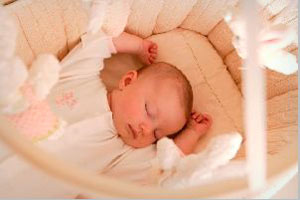 and are the main reason that every sixth parent starts to panic - something wrong is going on with the child, he flatly refuses to sleep! And, dear parents, the main culprits of all these misfortunes and misfortunes are you and me, and not imaginary illnesses or the “stormy temperament” of the baby! Sleep for children under one year is a natural physiological need. If you do not interfere in this process, then no violations will appear in principle! We, with our excessive zeal, do not rarely disturb the natural balance in the body of a newborn. Below we provide a list of actions on the part of parents that cannot be done in any way (of course, if you don’t want to look for a long and persistent search for the reason why the baby refuses to fall asleep).
and are the main reason that every sixth parent starts to panic - something wrong is going on with the child, he flatly refuses to sleep! And, dear parents, the main culprits of all these misfortunes and misfortunes are you and me, and not imaginary illnesses or the “stormy temperament” of the baby! Sleep for children under one year is a natural physiological need. If you do not interfere in this process, then no violations will appear in principle! We, with our excessive zeal, do not rarely disturb the natural balance in the body of a newborn. Below we provide a list of actions on the part of parents that cannot be done in any way (of course, if you don’t want to look for a long and persistent search for the reason why the baby refuses to fall asleep).
1. The absence of whatever the daily routine and sleep and wakefulness. "The kid refuses to fall asleep" - mom complains, while the child either stays awake until the dream literally knocks him down, or the careless mom fucks the baby in vain at that moment when he has no prerequisites for sleeping. Modern pediatricians do not insist on well-planned feeding and sleeping, but by 4-6 months of life the baby Saami chooses its natural biological rhythm - the baby asks for the breast (bottle with the mixture) at about the same time, add approximately equal intervals of sleep and wakefulness . But! In order for the child to be able to make up his daily routine quite freely and naturally, and the parents themselves should contribute to this in every way. So, if you unobtrusively offer your baby a nap during a certain time interval, monitor the condition of the baby and not miss the moment when the baby is really ready for bed - problems with falling asleep (both day and evening) will never affect you. And on the contrary, if you allow the newborn to become excessively tired, to re-energize your immature psyche, then there can be no question of a quiet withdrawal to sleep! Nonsense, but children who were not allowed to fall asleep at the moment when they really wanted it, later refuse to fall asleep at all, while tormenting themselves terribly and harassing their parents with whims and unreasonable crying. Make it a rule to sensitively catch the natural needs of your baby, do not let him overexcited and get too tired. Gently, unobtrusively, with a planned form an approximate sleep pattern for your child. and wakefulness.
2. Lack of "sleep rituals". In pediatrics, there is such a thing - "sleep ritual", which includes a whole range of measures and actions on the part of parents, aimed at a quiet retirement of a newborn child to sleep. The rituals in each family are purely individual. We will give you just a few tips:
- Daily follow the same action algorithm. For example, an evening walk, swimming, sleep.
- Get special "sleepy" accessories - pajamas for the baby and nightgown for mother, a bottle for evening feedings, a toy, with which the baby will fall asleep. Gradually, the child, seeing these "sleepy" objects, will naturally tune into sleep.
3. Failure to comply with the temperature. Children categorically refuse to fall asleep in a room where the air is too dry and warm! Do not forget to air the children's room even in the cold season. Eliminate all irritating factors - strong odors, tobacco smoke. Get special air humidifiers. Do not forget that the optimum temperature in the children's room is 18-20 degrees, but not higher!
4. The lack of daily regimen from parents. If you yourself and all members of your family are inclined to stay awake at night and are used to relaxing during the day, then there can be no question of any sleep or wakefulness pattern in the baby! Your child already from this age sensitively catches family biorhythms. As a result, you will feel for yourself what one of the most common sleep problems in newborns means when a child begins to confuse day with night. Get rid of this uniquely bad habit will be oh how hard!
We brought you only the most common mistakes made by parents. In each individual family, problems can vary, combine each other and accumulate like a snowball ... However, if you use these recommendations, very soon the baby will begin to delight you with its deep and long sleep.
Echo "zz";?\u003e
The vast majority of parents are faced with the problems of falling asleep to their newborn sons and daughters, which are accompanied by prolonged crying.
Restless tearful sobs disturb the newly minted mother and father day and night: sometimes the sweet lullabies, the soft motion sickness, or the light music help the newborn to fall asleep.
Why is the child worried? What pushes him to cry before bed, and how can he be helped in this situation?
Psychological causes of crying before bedtime
Surprisingly, newborns cry shortly before sleep for a variety of reasons. Moreover, most babies before crying can cry not only before sleep, but also after it. After all, every day during the first few months of life it turns out to be the strongest stress for them.
If a child cries before bedtime, the reasons may be:
Excessive nervous tension
In most cases, infants cannot cope with the enormous load that affects the nervous system throughout the day. For this reason, the baby, approximately one to two hours before bedtime, begins to cry hysterically, so that it is almost impossible to calm him down.
In such a situation, parents should not panic, because such behavior of the crumbs is the norm. The cry promotes the release of unused energy, with the help of crying, nervous tension is removed and neutralized.
Increased nervous irritability
Often, parents, tormented by their babies' long evening tearful hysterics, seek advice from a neurologist and end up with a diagnosis that sounds like "increased nervous irritability."
Do not be afraid, when viewed from children under three years of age, such a diagnosis is made in seventy percent of cases. An increased excitability prevents the child from sleeping until he cries out all the energy. Then the baby calmly and serenely falls asleep.
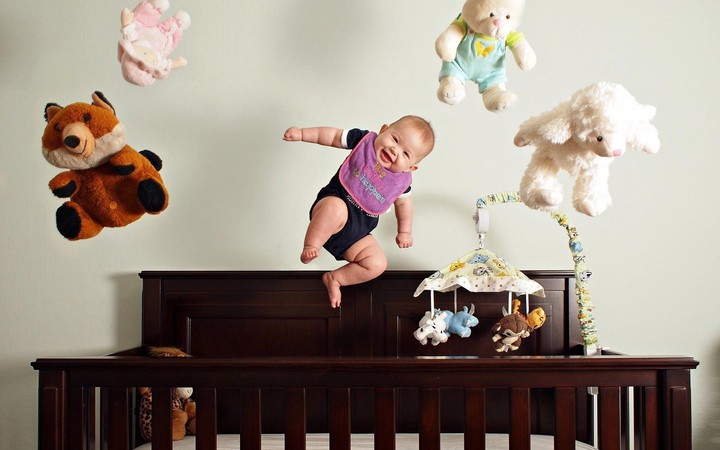
In this case, there is no reason to experience again. For a child, crying is a great opportunity to calm down.
Failure of the day regimen
In most cases, it is this cause that is associated with trouble falling asleep. Most parents make a serious mistake when they allow the child to go to bed when he sees fit.
According to modern pediatricians, it is important to have a strict day modewhich will be associated with a child with calm and stability.
Experiencing that at the time of sleep, his mother will leave
A large number of babies are also very worried about being separated from their mother, who is for them the most important person in their infancy.
Nightmares and fear of the dark
Fright too common cause restless behavior of the child before bedtime. The child may be frightened by the darkness in which he does not see the mother or does not feel her presence. Sometimes children can also have terrible dreams, after which they wake up with a loud cry. The best way to solve this problem would be a joint dream with the mother.
Physiological causes of crying before falling asleep
No less rare small child crying before bedtime and because of the peculiarities of his physiological state:
Teething
Often the appearance of the first teeth is accompanied by sleep disorders and increased anxiety. Swelling of the gums, pain, itching make the baby irritable, make for significant discomfort.
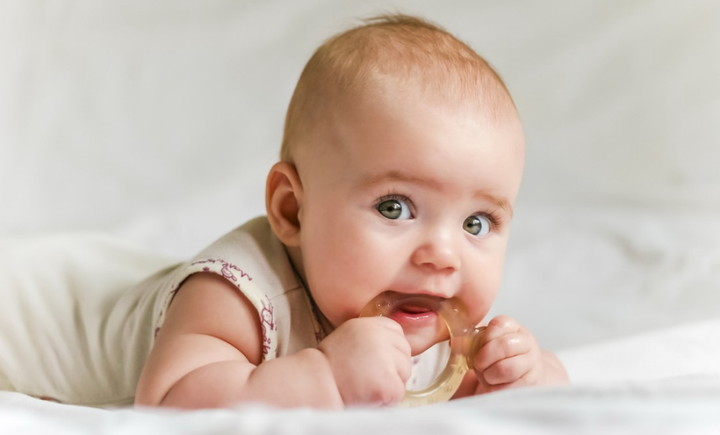
To help the child, you should lubricate his gums with a special gel with an anesthetic effect and give a soft teether.
Intestinal colic
In 90% of cases, the first three months of life in infants are plagued by colic, which is manifested by strong knee-ups to the abdomen and loud crying. In order to calm the baby down, it is necessary to put a warm diaper on his tummy or to put the baby on his mother’s bare belly.
If a warm compress does not help, infants need to offer Plantex or tea, which includes fennel. However, situations are quite complicated. In this case, the parents, after the council with the pediatrician, can use medicines.
How to help a restless baby fall asleep?
Parents should understand, the crying of a healthy newborn is an absolutely understandable and natural phenomenon.
Satisfying physiological needs
First you need to correctly establish the cause of the baby's anxiety, why it is he who cries shortly before sleep, excluding such physiological circumstances as:
- dirty diaper
- uncomfortable posture
- cold,
- tight clothes
- hunger.
If mom and dad fixed it all, but the baby is still crying, you need to check his gums for the presence of puffiness. Maybe his first teeth are cut. In this case, it is enough to treat the gums with a special gel.
Exception disease
In addition, in this case, parents should tell the district therapist who is observing the baby about the anxiety and crying of the child. In some cases, the attending physician may send the child for examination by a neurologist or other specialist.
Increased irritability and persistent disorders of day and night sleep can be causes of serious diseases. Solve this problem it is urgently needed, because without a good, normalized sleep, the proper functioning and development of the child’s body is impossible.
Psychological balance of parents
A young mother should know that her relationship with the baby is strong enough, so her emotions and mood should be positive and positive. At bedtime, she should be as calm as possible, then the baby will be able to sleep soundly.
If the parents are nervous because of the crying child, he will become even more capricious and will not be able to calm down.
Bathing with the addition of herbs
A young mother whose baby is anxious when she falls asleep should, as a rule, bathe her child in the warm bath in the evening with the addition of a decoction from a set of soothing herbs. A special infusion used for swimming will help nervous system relax, and prepare her for bed.
Every day should be followed the same sequence of actions before bedtime.
Taking sedatives
If we talk about drug therapy, you can use the infusion of valerian. Daily in the evening you can add a drop of valerian to the baby’s milk or water. However, the result may be slow as this method has a cumulative effect.
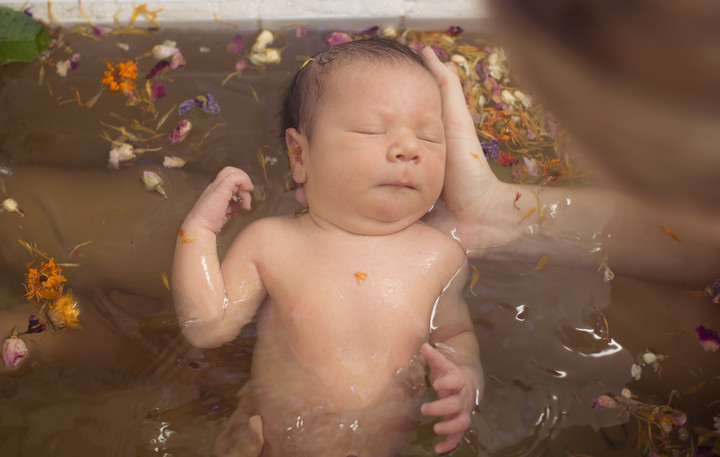 After the course of taking a month long baby will be calmer. But, we note that before using drops of valerian, you should always consult a pediatrician.
After the course of taking a month long baby will be calmer. But, we note that before using drops of valerian, you should always consult a pediatrician.
Features of a children's dream: why the baby can cry without the reason?
Infant sleep has its own characteristics. Day and night sleep is characterized by alternating periods of strong, deep sleep and superficial. In infancy, superficial sleep, which repeats every hour, is longer than that of adults.
Being in this phase, the baby can wake up from the slightest sound, after which it will be very difficult to lull him, for this reason, newborns rarely sleep more than four hours in a row.
In some cases, the baby can sleep during the day, waking up every 30-40 minutes. Such a circumstance cannot be considered the norm, however, it cannot be attributed to diseases either, provided that sleep at night will not be interrupted with the same frequency.
In such cases, anxiety is often due to the need for maternal affection and warmth. Some of the parents claim that you don’t need to take the newborn in your hands too often. This is fundamentally wrong. Every mother should realize that the lack of parental attention will be alarming in the body of the crumbs.
Often, mothers who show more care and affection for their child, take him in their arms, notice that the crumbs' day and night sleep become measured and the baby stops crying for no reason when he falls asleep.
When a child turns one year old, he begins to sleep twice a day for one and a half to two hours, while a night's sleep lasts up to ten to twelve hours. By this age, the baby’s biological clock should be fully debugged.
A one-year-old child sleeps on average about 13–14 hours per day, 2.5–3 hours of which occur during daytime sleep.
Already by two years the biological need for daytime sleep will decrease. Therefore, with a loud cry, a child may protest against sleep. However, the baby still needs to be reassured, to allow him to cry and put to bed. In time, the child will become accustomed to the regime and will fall asleep calmly and without crying.
How to adjust the child's biological clock?
For approximately the first six weeks of their life, the infant will become accustomed to the changes in the external world that have come to him. When the crumb gets a little comfortable, parents can teach it to day and night sleep.
The most effective method of adjusting the work of biological clocks is to accustom the baby to the regimen. If the baby falls asleep with crying before daytime sleep, it should be distracted from the turbulent games.
To do this, you can collect toys with your baby, make the bed together. Modern pediatricians do not recommend feeding a baby or cradling just before sleep, so as not to develop an appropriate habit. It is best to lie down next to the child and hug him.
The room where the child will sleep should not cause him negative emotions. Even if the child is afraid of the dark, do not leave the lights on at night. To the kid was able to distinguish between daytime and night, you can turn on the night light at night.
Also against crying will help the "toy protector", in the role of which a soft children's blanket or a teddy bear can act. The first night, the mother can put the toy to sleep next to her so that the material can absorb its smell.
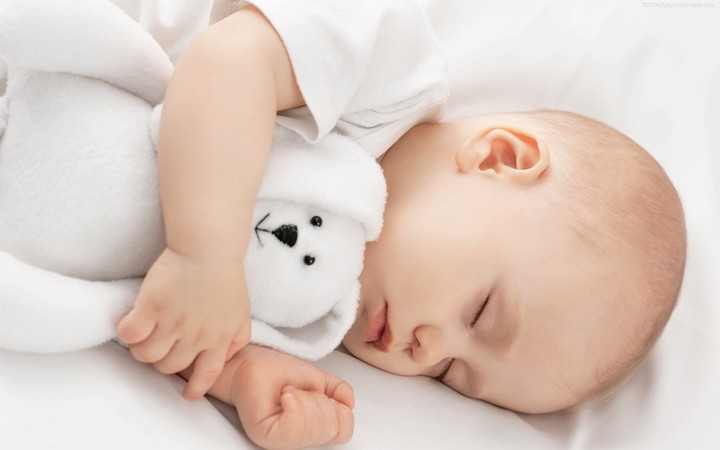 Kids have a delicate sense of smell, so this “talisman” is able to calm them down before night or daytime sleep. A child can fall asleep with crying at any age, but from four to five months a child can be allowed to cry.
Kids have a delicate sense of smell, so this “talisman” is able to calm them down before night or daytime sleep. A child can fall asleep with crying at any age, but from four to five months a child can be allowed to cry.
Before going to bed at the same time, one should bathe the child, feed him, read calm tales to him or sing lullabies. The child must be clearly aware that the night has come and in the next 10-12 hours he will have to sleep.
If the child wakes up at night, the mother should not talk to him. Only in this way the baby will understand that the night is not the time for games or conversations.
Why can a baby cry in a dream?
Nightmares are the most common cause. Children can see unpleasant dreams after a hard, hearty dinner just before bedtime.
Therefore, parents should not feed the baby later than an hour before bedtime. For dinner, it is better to choose light foods. Ideal warm milk. Minimize the possibility of nightmares will be able to mode, to deviate from which it is possible with rare exceptions, for example, because of a visit or a trip.
A popular reason is also considered to be watching TV or playing computer games. No matter what the baby will watch shortly before sleep, even the most innocent cartoons can provoke scary dreams. Therefore, in order to avoid problems with falling asleep, it is necessary to minimize the time he spends in front of the TV.
You can soothe the child at night by gently stroking him on his back. Light wiggles on hands will also help.
According to statistics, about 30% of children under one year old have a sleep disorder. This is reflected in the difficult falling asleep, frequent waking up, crying during, before and after sleep. Why does a baby cry before bedtime? The reasons can be many, and parents should act depending on the specific reason. If you do not take any measures, hoping that crying before bedtime is associated with age and the child simply outgrows it, then later your baby may have serious problems not only with sleep, but also with mental state.
Nature of baby crying
Infants do not know how to talk, so they can bring any information to an adult only with the help of crying. Children cry and cry when they experience any discomfort that is not necessarily associated with their well-being. The reason for crying can be loud annoying sounds, emotional over-excitement, protest due to falling into the wrong hands, fear due to the fact that mom has gone somewhere.In terms of the strength and loudness of a crying child, doctors can draw conclusions about their state of health. A sick and weak newborn cries quietly and plaintively. A loud demanding cry that attracts attention speaks of good health and nutrition.
If the cause of crying is a physical necessity (for example, in food and warmth), then it ceases when this need is met (after getting access to milk, warming). If the reason is emotional perevozbudimost, then the baby will calm down only after he throws out his tension - will cry, scream, actively wave his arms and legs. That way he gets rid of stress.
Features of baby sleep
Sleep is extremely important for every person, and even more so for a growing baby. This is the most the best way restore strength spent in the period of wakefulness. In the process of sleep, the child grows, development and strengthening of his immune system takes place, and the brain organizes the information obtained. The quality and quantity of sleep affect the behavior of the baby during the day.
If the child does not get enough sleep, then this negatively affects his behavior during the day. He remembers information worse, eats little, demonstrates his bad mood, screams, cries, capricious. Therefore, frequent whims can sometimes indicate that the baby is not getting enough sleep.
Sleep mode needs to be shaped right from early age. He will provide a full sleep, not only the child, but the whole family. Every day at the same time, the baby needs to be bathed, dressed in pajamas, reading a book or singing a lullaby, putting to bed. Strict adherence is associated with stability in children.
Physical causes of crying before bed
When the baby does not go to bed and cries, no need to panic, shout at the baby, express your discontent. Parents need to calm down, pull themselves together and identify the cause of concern for their offspring.
A child may refuse to sleep and cry because of feelings of hunger. Perhaps he is no longer fed on mother's milk and needs to be fed with a mixture if he is not yet 6 months old, or an adult food if he is more than 6 months old. When such a problem arises in the baby up to six months, it probably means that lactation problems arise. Mother should drink special teas that stimulate the production breast milk, change the position of feeding, consult a breastfeeding specialist.
Usually, a hungry cry begins with a whimper, and then turns into a loud demanding cry. In this case, the baby shakes his head from side to side, looking for a breast or bottle.
Many children refuse to fall asleep when they have a full diaper. They report this cry.
A cry of complaint is evidence of pain.
Teething is an unpleasant process that causes discomfort in many babies. Even if before their appearance is still far away, the child may be disturbed by itching, which is aggravated by the evening, when the baby gets tired. Special ointments or gels help soothe the itch.
A baby cries when she can't sleep. He can be disturbed by various environmental factors: loud noises (TV on, noise of the freeway, hammer or drill during the repair), bright light (it is better to use a night light when putting the child to bed), stuffy or cold. If the baby is hot, his face turns red and the temperature rises. He cannot sleep properly in a poorly ventilated room. The absence of wet cleaning, stale air and dust will not allow the baby to sleep peacefully. If the baby still does not know how to roll over himself, then he will cry because of the uncomfortable position. Tight or uncomfortable clothing will also arouse the indignation of the child. He can push the folds of her blouse on the back, rub the seams or tag.
When the baby falls asleep, there should be no sharp around loud noises. However, he should not sleep in complete silence. It is better that he get used to sleep under the monotonous background sounds - the work of the washing machine, the muted voices of the household. So his sleep will be stronger, and in the meantime his parents will be able to quietly go about their usual activities, without fear of waking the baby.
A child aged 1 to 6 months may be disturbed by intestinal colic. They appear unexpectedly, towards evening, often before falling asleep. A child can almost continuously strongly scream for two hours. At the same time, he bit his legs, clenches his fists. After screaming and the pain disappears, he usually falls asleep. To help your baby with colic, you can put a warm diaper on your tummy, stroke it clockwise, carry your baby around the room with the tummy down. Some parents use a hair dryer, directing a stream of warm air on the tummy of the crumbs, the main thing - do not burn or scare the baby. The tummy heats up and calms down, and the monotonous hum of the hair dryer lulls. In exceptional cases of colic, use the vapor tube or the smallest rubber bulb with a cut off bottom. Gazics are so efficient, but with careless handling you can harm the baby.

To get rid of colic, you can water the baby with dill water and the nursing mother with tea with fennel. The child can be given medicine Infacol, Espumizan, Bobotik, Sub-Simplex or others. All of them have one active substance - simethicone. After the medication, the child quickly falls asleep. It is necessary to be careful, as the flavors in these preparations can cause allergies.
Colic may be caused by errors in the diet of a nursing mother or dysbiosis. In the first case, the mother should reconsider her diet, and in the second, she will need to pass the analysis and, if necessary, drink a course of medications with lacto-or bifidobacteria (for example, Bifiform baby). If the child is on bottle feeding, then colic may occur due to the fact that it is fed the wrong mixture.
Sometimes with colic does not help any of the above means. In such cases, parents have to be patient and wait until they pass.
If the baby's body does not have enough vitamin D, then there is a violation of calcium-phosphorus metabolism, which leads to the appearance of rickets. In the initial stages of the disease, there is a high neuro-reflex excitability, manifested in crying and worsening sleep. The kid becomes shy, irritable. This symptom usually appears in 3-4 months, but sometimes it can also after 1.5 months.
Emotional and psychological causes of crying
A child may cry a lot before falling asleep due to tiredness accumulated during the day. This often happens in adults. That is why, when time comes to sleep, you need to stop all active games with the baby and begin to engage in more relaxed activities, soothing and toning up for sleep. At this time, it is recommended to take a walk in the fresh air. If you can not go out, you can restrict the balcony.

If a child cries before bedtime, then excessive overstimulation may be the cause. During the day the baby gets a lot of impressions, especially if relatives come to him. With a cry and cry, he relieves stress, calms down. The child should be comforted by stroking, affectionate words, singing a lullaby. At first, this may not work, but if this is repeated in each case of his emotional stress, he will get used to it, and these actions will calm down more quickly.
According to statistics, 70% of children under the age of 3 years old neurologists diagnose "increased nervous excitability." There is nothing wrong with that. Children with such a diagnosis simply cannot fall asleep until they “shout out” all their excess energy. Their sleep is tender, superficial, often interrupted by crying.
Crying baby can be a protest that trying to put him to bed without a mother. If parents clearly decided that the child should sleep separately, in the crib intended for him, then they will have to withstand his protests. If it is difficult for them to hear the cries of their offspring, then it is worthwhile to arrange a joint dream. The baby will feel her mother’s warmth next to her, smell her, hear the sound of her heart, will calm down and sleep soundly. So the whole family will be able to rest, but the process of “relocation” into a separate bed in the future can be very painful.
Thus, a baby’s crying before bedtime is a signal that something is bothering him, does not allow him to fall asleep. Parents should respond to this signal in a timely manner, identify the cause of discomfort and take maximum opportunities to eliminate it.
Why do some kids fall asleep and sleep peacefully, while others are constantly waking up, sobbing, spinning in their sleep? Are there any pathologies in my child? .. Such questions are surely puzzled by parents who are confronted with such "violations" of infant sleep. We will deal with some violations of infant sleep, not associated with diseases.
Often, the difficulties of falling asleep and violations of infant sleep are associated with improper behavior of the child and parents during the period associated with sleep. In this article we will look at the little secrets of a good sleep of an infant.
Calm and restless sleep
Why do babies sometimes sleep peacefully and sometimes their sleep is more disturbing? Why can some children sleep all night without disturbing their parents, while others, on the contrary, wake up every two hours?
The reason for the restless sleep of a newborn is its inability to the world around it. Small children very often “confuse” day and night, they conduct a kind of “test” of strength for their parents. And only a few months later, a more or less well-established sleep and wakefulness mode is established.
Intestinal cramps can be the cause of restless sleep in an infant during the first months of life, and in older babies, anxiety may be caused by teething.
It so happens that the child sleeps restlessly at night because of its close connection with the mother or because of the so-called wrong “falling asleep associations”. Often a good sleep is prevented by excessive emotional overload during the day. And only the correct organization of the daily regimen and the correct “associations of falling asleep” will help eliminate infringements of infantile sleep that are not associated with the pathology of the nervous system.
“Right” and “wrong” sleep associations
According to statistics, in every sixth family the baby does not sleep well (that is, continuous sleep during the night is disturbed). I note that a frequent cause of violations of infant sleep is an incorrectly established sleep pattern of the infant, namely: the wrong associations of falling asleep.
What should be the correct sleep of the baby?
The infant must learn to fall asleep on its own, with minimal participation of adults. At night, it is necessary to minimize communication with the child during the approaches to the crib so that the child can distinguish the difference in behavior during the daytime and at night. This behavior is very important, since it is more difficult for a waking child to fall asleep than for an adult. Therefore, you need to establish a certain mode, thanks to which the baby will get used to fall asleep after a strictly established procedure: bathing, feeding, occasional communication with adults (bedtime story, lullaby).
The "wrong" associations of falling asleep include: rocking the baby in the hands of an adult, falling asleep in the parent's bed, during feeding, with a finger in the mouth, etc. Although, about the parental bed, you can argue. Now there are many arguments in favor of sharing sleep with a child. The main thing is to determine in advance for yourself what is more important for you and think in advance about how you will continue to share a bed with a child.
In an older child (after about 8 months), it is possible to develop such a “correct” association of falling asleep as falling asleep with the help of an “intermediary”. Mediator is often the favorite toy of the kid. I note that such a "good mediator" can be found for more young children. This may be a diaper or mother's robe, a cloth soaked in milk, preserving mother's smell.
It is important to know that with proper organization of sleep and wakefulness, the use drugs will not be a necessity. And before “feeding” the baby with drops or tea attributed by the doctor, try to adjust the harmonious sleep of the baby in a natural way.
With breastfeeding Mom's peace of mind contributes to a peaceful sleep. That is, if the mother is excited - do not expect peace from the baby. Start with yourself first!
Little secrets of good sleep
Based on the foregoing, we will focus on the main little secrets of a good infant falling asleep:
Develop your evening rituals. Even if the child is still very small, he becomes accustomed to his “regime” from the very first days of his life.
The cot should always be a place to sleep. Therefore, the baby during the day should play in other places so as not to “confuse” a place to sleep at night with a place to play and wake.
Try, from about three months of age, to put your baby to bed at the same time.
I recommend to feed the baby wrapped in a towel or blanket before going to bed, thus creating a “nest” for him, with which you will put the sleeping son in bed.
Create an atmosphere of falling asleep: dim lights, quiet music or in general its absence, quiet monotonous conversation.
Lullabies and bedtime stories
A lullaby has always been considered a good “sleeping pill” for an infant. There are good reasons for this, because my mother's voice always acted lulling. And do not be afraid to sing your favorite baby a lullaby, even if you do not have vocal abilities. Thanks to the lullaby, the mother conveys love, warmth, tenderness, peace and tranquility to the child. What else is needed for a good happy sleep? By creating such a tradition of peculiar communication with a child before bedtime, you create a trusting atmosphere between you and the child, which will last for many years. Sing lullabies to your kids, give them the joy of communicating with you, and good dream your baby is guaranteed, because it is surrounded by your warmth and love!